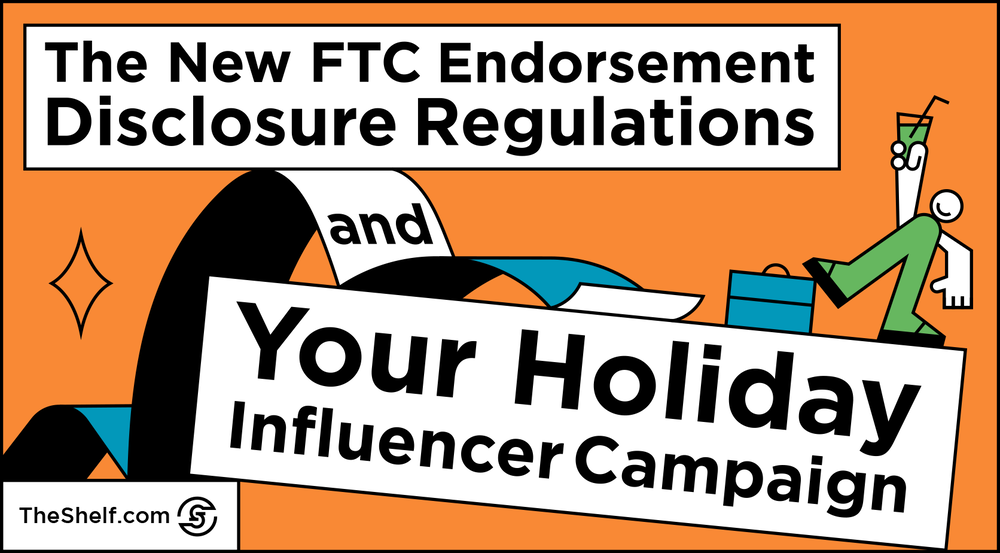This week, the FTC released its newest publication on endorsement guidelines called Disclosures 101 for Social Media Influencers. Disclosures 101 is the latest in just a handful of publications the U.S. Federal Trade Commission has put out to provide a list of basic best practices for brands partnering with creators to get endorsements and influencer-created content.
We published our first article on FTC regulations back in 2015 and put out another update in 2017 to go over some of the newer recommendations from the FTC surrounding endorsements. Well, gang, it’s that time again. And these changes are big enough for you to be totally out of the loop (and possibly on the wrong side of the law) if you don’t know them.
Disclosures 101 details a couple of really important shifts in the way brands, and especially influencers, are to share disclosures online. So, let’s just get to the meat of it.

What Do the Newest FTC Regulations Require An Influencer to Disclose?
In a word: everything.
The big takeaway the FTC wanted us to get with this one is an influencer doesn’t have to disclose that she doesn’t have a relationship with a brand. Everything else, though, she pretty much needs to announce as people are coming through the doors.
Here’s What Changed… And These ARE Notable Changes
Going forward (and just ahead of the holiday season, no doubt), new FTC regulations will require influencers to make obvious any paid endorsement or pre-existing relationship with a brand. AND disclosures need to be pretty easy for others to find.
LIKES, TAGS, PINS ARE ALL OFFICIAL ENDORSEMENTS NOW
A paid endorsement is any favorable interaction you take on a brand’s behalf (or in support of a brand) for which you receive something of value, whether it’s money, free products, a free service, discounts on swag, access to an event, other perks… whatever it is.
The term “favorable interaction” is my term, not the FTC’s term. But it pretty much describes what the FTC may be talking about when it says:
Keep in mind that tags, likes, pins, and similar ways of showing you like a brand or product are endorsements
👀
It very well may be that if I simply Like ❤️ a post from a friend who’s crushing it selling her line of hair care products (totally a real scenario), I may need to disclose to the world that we’ve spent a few hoildays together in order to provide her with that Like AND make sure I’m still on the FTC’s good side.
YOUR MATERIAL CONNECTIONS JUST BECAME MORE IMPORTANT
Let’s talk about the pre-existing relationship part. The FTC calls it a “material connection” and it comes into play anytime you start talking up a product that will benefit someone you know. That could be a friend, family member, co-worker, a guy you dormed with during freshman year but couldn’t really stand, your ex’s new bae (because you’re trying to be the best version of yourself)… any one of those relationships can qualify as a material connection according to Disclosures 101.
Paid or unpaid, if you have a material connection with a brand, you may need to reveal that when you endorse that brand, i.e. by engaging positively with a branded post.
So, that MAY mean every product I Like that happens to be affiliated with someone I know could look something like this…
[❤️ ] Obsessed with the vitamin E hair oil Eva let me try… and I’m not just saying this because she’s my kids’ stepmom. The oil really is that good. #sponsored
👀
This is an extreme example, I know. The FTC isn’t trying to make me admit my relationship with everybody I know… I mean, probably not…
The thing is there’s lots of room for interpretation. While the FTC regulations around influencer marketing do leave some questions unanswered (and therefore open to interpretation by the FTC), I wanted to point out these potential (reddish-colored) flags before detailing the specific changes influencers must make with regard to how they disclose partnerships and relationships during endorsements.
Now… here are the changes.
What the New FTC Disclosure Rules Changed About Sponsored Posts on Each Platform
New FTC Disclosure Rules for Sponsored Posts
You know how influencers typically add hashtags like #ad #sponsored #brandambassador #partner to the end of a sponsored post (usually buried in a sea of other hashtags)? Well, that’s still good to do, but it’s no longer the only thing influencers will need to do.
The new FTC regulations are pushing influencers who are posting to platforms like Facebook, Instagram and Pinterest to feature disclosures early (like, really early) in the caption, not at the bottom of the post and not buried in the hashtags.
New FTC Disclosure Rules for Disappearing Sponsored Content
If it’s content for a disappearing message platform like Snapchat or Instagram Stories, the recommendation is to superimpose the disclaimer or sponsored post hashtag on the actual image being posted AND make sure it stays up long enough for followers to really see (and mentally digest) the disclosure.
New FTC Disclosure Rules for Sponsored Videos
If you’re used to seeing blurbs about the brands mentioned and featured in videos in the description under the video, you’ll probably continue to see that. But you’ll also start hearing vloggers verbally disclose that they are endorsing specific products in the video.
It’s better for viewers to see AND hear the endorsements, so the FTC also recommends vloggers superimpose disclosures on the actual video. Most videos are watched – either in part or in their entirety – with the sound off, so it’s important for vloggers to be transparent by creating more opportunities for viewers to know when a video is sponsored.
New FTC Disclosure Rules for Streaming Video
With live streams and webinars, the key is to repeat the disclosures at different points throughout the video. The idea is whether viewers watch the beginning, the middle, or the end of the broadcast, there should be disclosures built into the presentation to make sure viewers have the best chance of knowing about the endorsements.
The FTC Are the Good Guys
At the end of the day, we all want influencer marketing to seem like less of a risk for brands, and ditch its reputation for being all shady and wild west. Over the last five years or so, the FTC has continually refined endorsement regulations to ensure brands are holding their influencer partners to disclosure standards. And it’s a good thing. Please bookmark and share this post.
And download Disclosures 101 for Social Media Influencers for yourself.




